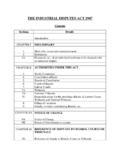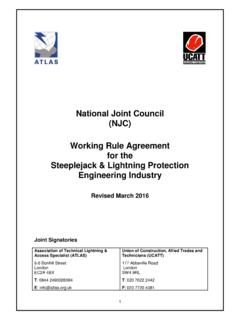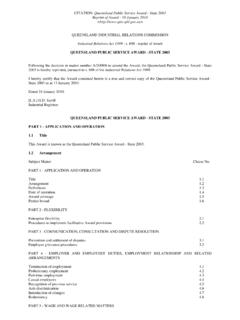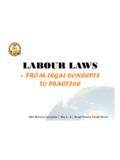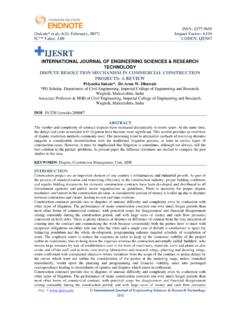Transcription of IN THE LABOUR APPEAL COURT OF SOUTH AFRICA …
1 IN THE LABOUR APPEAL COURT OF SOUTH AFRICA (HELD AT JOHANNESBURG) case NO: JA 50/03In the matter between :WYETH SA (PTY) LTDA ppellantandMANQELE, TFirst RespondentMOLETSANE, R NOSecond RespondentTHE COMMISSION FOR CONCILIATION, MEDIATION AND ARBITRATIONT hird RespondentSECURITY RETAIL TRANSPORT & ALLIED WORKERS UNION OF SOUTH AFRICAF ourth RespondentNICHOLSON JA; PILLAY AJA; NKABINDE AJAJUDGMENTNKABINDE AJA:INTRODUCTION AND FACTUAL BACKGROUND[1]This is an APPEAL against the judgment of the LABOUR COURT in which that COURT dismissed an application to review the ruling by the second respondent ( the commissioner ) that the first respondent, Mr T Manqele ( Manqele ), is an employee as defined in terms of s 1 213 of the LABOUR Relations Act No. 66 of 1995 ( the LRA ).[2]The facts of this case , briefly dealt with hereunder, are relatively simple but give rise to interesting and controversial points of law. [3]On 14 March 2000 and pursuant to an interview the appellant made a written offer of employment ( the contract ) to Manqele for a position of a sales representative in the Nutritional Division at its Midrand offices.
2 The commencement date was 1 April 2000. The contract deals, inter alia, with employment duties, termination of employment, remuneration, hours of work, medical aid fund, free life assurance, overtime, sick leave et appellant sought written acceptance of the offer. On 15 March 2000 Manqele accepted the offer by signing the contract in a space provided. [4]The appellant undertook to provide Manqele with a company motor vehicle for company business and reasonable use for private purposes as part of his remuneration package.[5]Prior to the offer on 14 March 2000 and the acceptance thereof on 15 March 2000 the appellant advised the employee to look for a new motor vehicle for a maximum purchase price of R124 000, 00 as the company which financed the motor vehicle was not prepared to finance second hand motor vehicles. The employee selected a BMW 316 motor vehicle which upon inspection, by the financing company, turned out to be a second hand motor vehicle.
3 Accordingly the appellant s Human Resources Manager, Mr G Whitefield ( Whitefield ), maintained that such vehicle could not 2 be financed. Manqele was advised again to find a new motor vehicle. On 14 March 2000 he identified an Opel Astra motor vehicle. It is then that Whitefield, allegedly believing that the issue of a new motor vehicle had been resolved, made the aforementioned offer of employment to Manqele which the latter accepted on the next day. A few days thereafter Whitefield was advised by the financing company that the selected Opel Astra motor vehicle had gone out of production some time ago and could therefore not be a new motor vehicle as allegedly represented by Manqele. Whitefield made enquiries about the Opel Astra. According to him he considered Manqele s alleged misrepresentation in a serious light.
4 He then discussed the matter with senior management. Prior to 1 April 2000, being Manqele s date of commencement, Whitefield terminated the contract of emplyment because the parties had been unable to reach consensus as to the condition of the motor vehicle as stipulated in the letter of employment . Manqele nevertheless reported for work on the commencement date. He was advised by the appellant s human resources officer that he would not be employed by the appellant and that he should leave the premises . He then left the premises. [6]Manqele alleged an unfair dismissal in terms of s 191(1) of the LRA and referred the matter to the third respondent, the Commission for Conciliation, Mediation and Arbitration ( the CCMA ), for conciliation. He was and continues to be assisted by the fourth respondent, Security Retail Transport & Allied Workers 3 Union of SOUTH AFRICA ( RAWU ).
5 The matter was set down for conciliation but the appellant, according to the certificate of outcome, failed to attend the conciliation. The dispute remained unresolved. It was then referred to arbitration. [7]At the arbitration the appellant raised a jurisdictional point contending that the CCMA lacked jurisdiction to conciliate the dispute because no employment relationship had come into existence between itself and Manqele. The parties agreed that this point be determined on the papers. [8]The Commissioner, in dismissing the point raised, determined that 30. From the it is apparent that the Act envisaged a dismissal as also including cancellation ofa contract of employment. casu this is exactly what happened, the respondent terminated the contract of .. only the employee can be dismissed. In my view Mr Manqele became an employee the moment he accepted an offer of employment.
6 [9]On review in terms of s 158(1) (g) of the LRA the appellant raised two grounds, contending that the commissioner committed: (a) a gross irregularity in handing down a ruling in circumstances where another commissioner had heard oral submissions from the parties respective representatives concerning the merits of the matter ; and(b)a material error of law entailing non performance of his duties alternatively that he arrived at an unjustifiable conclusion in determining that Manqele was an employee of the appellant as defined in s 213 of the LRA. [10]The LABOUR COURT dismissed the application with costs and found 4 that Manqele, as a party to a valid and binding contract of employment, is an employee for the purpose of a claim under Chapter VIII of the LRA. [11]On APPEAL , leave having been granted by the COURT a quo, the appellant s main ground of APPEAL is that the COURT a quo erred in finding that the definition of employee as contemplated in s 213 of the LRA includes a person who has entered into a contract of employment but has not commenced employment.
7 It is contended that the COURT a quo ought to have found that the commissioner, in finding that Manqele was an employee on the basis of him having concluded a contract of employment with it even though the former had not yet commenced working, committed misconduct in the performance of his duties, alternatively, committed gross irregularities in the proceedings, and further alternatively, exceeded his powers. [12]Basically the APPEAL concerns two questions (a) whether or not the contract of employment was concluded between the appellant and Manqele when it was cancelled by the former prior to the date of commencement; and(b)whether the provisions of the LRA are available to a person whose contract of employment is terminated prior to the commencement of employment and specifically whether the definition of employee includes persons in the position of Manqele . 5 WAS A CONTRACT CONCLUDED?[13]The first issue is whether a contract of employment was concluded or not.
8 In law the legal relationship between the parties may be gathered, inter alia, from a construction of the contract which they have or might have concluded (See Smit v Workmen s Compensation Commissioner 1979 (1) SA 51 (A) at 64B; Liberty Life Association of AFRICA Ltd v Niselow (1996) 17 ILJ 673 (LAC) at 683D E; SA Broadcasting Corporation v McKenzie (1999) 20 ILJ 585 (LAC) at 591E). Regard must also be had to the realities of the relationship and not what the parties have chosen to call the contract (See Dempsey v Home & Property (1995) 16 ILJ 378 (LAC); Brassey The nature of Employment (1990) 11 ILJ 889 at 921). At common law an employee in a contract of employment commits a breach thereof he reneges on his duty of placing his personal service at the disposal of the employer. The employer on the other hand breaches the contract of employment if he reneges on his undertaking to pay the salary or wages agreed in consideration for services rendered.
9 [14]The appellant s contention, as evident from the averments in the founding affidavit deposed to by Whitefield, is, firstly, that the contract of employment was not concluded or finalised because an important term of the agreement concerning the vehicle .. still had to be finalised and that the parties could not reach an agreement on the price or type of vehicle to be purchased . Counsel for Manqele submitted that a contract of employment had been 6 concluded. It is beyond question that the terms sought to be introduced on behalf of the appellant by Whitefield do not form part of the written contract. The undertaking by the appellant, evidently as part of its obligations in terms of the contract, was to provide Manqele with a company car for both company business and reasonable use for private purposes. According to the parol evidence rule when a contract has been reduced to writing, the writing is in general regarded as the exclusive memorial of the transaction and no evidence to prove its terms may be given save the document or secondary evidence of its contents, nor may the contents of such documents be contradicted, altered, added to or (See Union Agreement v Vianini Pipes (Pty) Ltd 1941 AD 34 at 47).
10 Accordingly, the appellant is not entitled to introduce or add new terms or vary the terms of the contract. In any event that, in my view, did not materially change the purpose of the contract least of all the essence of the intention and the realities of the relationship between the parties.[15] There is no doubt that the parties had concluded a contract of employment when the appellant reneged before the commencement date. WAS MANQELE AN EMPLOYEE?[16]Having concluded that an employment contract was concluded between the appellant and Manqele, the next question for consideration is whether Manqele was an employee as defined in s 7 213 of the LRA. The appellant s contention is that he was not because he had not worked and was neither remunerated nor entitled to remuneration as contemplated in the definition. In essence the contention on behalf of Manqele is that the definition should be interpreted extensively to include a person in the position of Manqele.











